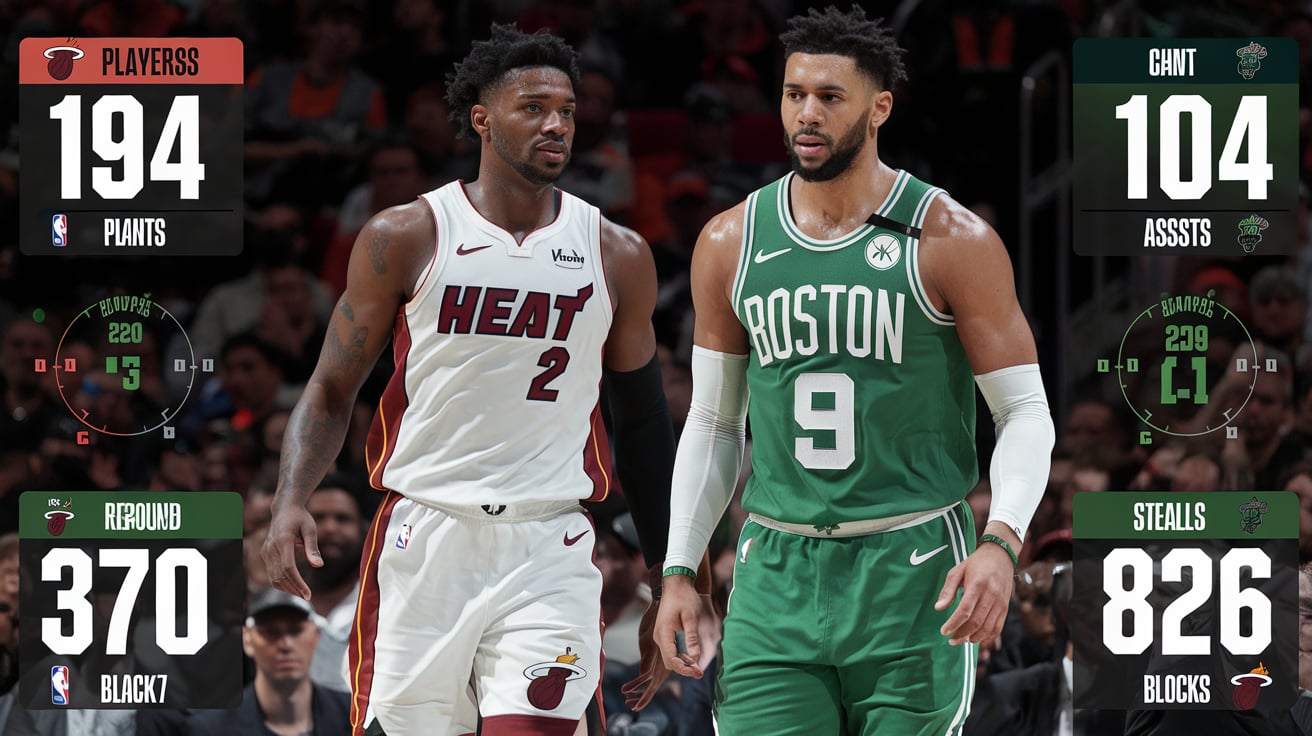Introduction to the Miami Heat vs Boston Celtics Matchup
The rivalry between the Miami Heat and the Boston Celtics is one that is laden with historical significance, contributing to the narrative landscape of the National Basketball Association (NBA). This rivalry can be traced back to the early 2000s and has intensified over the years, particularly during crucial playoff encounters. The Celtics, a storied franchise with a rich history and numerous championships, have often found themselves in fierce competition with the Heat, especially during the periods when both teams were at the zenith of their performance.
A pivotal moment in the Miami Heat vs Boston Celtics match history was the 2012 Eastern Conference Finals, where the teams faced off in a highly scrutinized seven-game series. This matchup not only highlighted the individual brilliance of players like LeBron James and Paul Pierce but also showcased the strategic battle between coaches Erik Spoelstra and Doc Rivers. Such high-stakes games have solidified the rivalry, making each encounter significant in the context of the NBA playoffs.
Overall, the implications of these matchups extend far beyond mere individual victories or losses; they often influence playoff standings and championship aspirations. The resulting player statistics from these games serve as critical indicators of team performance, providing fans and analysts alike with deeper insights into the strengths and weaknesses of both teams. Understanding the key metrics and standout performances can ultimately dictate the outcomes of these thrilling contests. The analysis of these player stats during a Miami Heat vs Boston Celtics matchup will reveal emerging trends and highlight the pivotal players who define this intense rivalry.
Key Players to Watch in the Latest Matchup
As the Miami Heat face off against the Boston Celtics, the spotlight will undoubtedly be on several key players from both teams whose performances could significantly influence the outcome of the game. For the Miami Heat, Jimmy Butler continues to be an indispensable leader and a prolific scorer. With an average of over 22 points per game this season, Butler not only excels in scoring but also plays a pivotal role in playmaking, averaging around 6 assists per contest. His ability to drive to the basket and create offensive opportunities for his teammates makes him a central figure in the Miami Heat’s game strategy. Furthermore, Butler’s defensive prowess cannot be overlooked, as he regularly matches up against the opposing team’s top offensive threats, significantly impacting the Miami Heat’s defensive effectiveness.
On the other hand, the Boston Celtics will rely heavily on Jayson Tatum, whose recent performances have firmly established him as one of the league’s elite forwards. Tatum has been averaging close to 26 points and 8 rebounds per game, showcasing his versatility as a scorer and rebounder. His ability to shoot from long range, combined with his skill in transitioning to the rim, poses a significant challenge for opposing defenses. Tatum’s recent showings, especially in critical moments, highlight his potential to turn the tide in favor of the Celtics. As the match unfolds, the contributions from Tatum, paired with the strategic elements orchestrated by head coach Joe Mazzulla, will be crucial for the success of the Celtics.
Both players, Jimmy Butler and Jayson Tatum, are not only key contributors but also serve as emotional leaders for their respective teams. Their performances in the Miami Heat vs Boston Celtics match will be essential for determining the momentum and overall outcome of the game, making them pivotal to watch in this highly anticipated matchup.
Detailed Player Stats Breakdown
The recent matchup between the Miami Heat and the Boston Celtics showcased a variety of individual performances that were critical to the outcome of the game. The player stats from the Miami Heat vs Boston Celtics match reveal significant insights into how each athlete contributed to their team’s efforts. For instance, key players such as Jimmy Butler from the Heat and Jayson Tatum from the Celtics had notable performances, directly affecting their team dynamics.
When examining points scored, Butler led the Heat with an impressive total of 28 points, exhibiting significant offensive prowess. His effectiveness was complemented by his 7 assists, showcasing his versatility as a player. On the other hand, Tatum contributed 30 points for the Celtics, accompanied by 9 rebounds, highlighting his dual-threat capability on both ends of the court. Looking closely at the shooting percentages, Butler achieved 50% from the field and 40% on three-pointers, while Tatum maintained a slightly higher 53% from the field, further emphasizing a competitive shooting battle between these two stars.
Defensive contributions also played a pivotal role in the Miami Heat vs Boston Celtics match. Players like Bam Adebayo and Robert Williams III were instrumental in protecting the paint, with Adebayo recording 2 blocks and 10 rebounds, and Williams adding 3 blocks to his stats. The steals count highlighted the aggressive defensive schemes employed by both teams, with the Heat accumulating 8 steals compared to the Celtics’ 6. This difference showcases the Heat’s capacity to disrupt Boston’s offensive rhythm, leading to crucial turnovers that flipped the momentum at various points in the game.
Through this detailed breakdown, it is clear that the player stats from the latest encounter provide a rich narrative of how the game unfolded and the individual contributions that shaped its outcome.

Implications of Player Stats for Future Matchups
The analysis of player statistics from the recent Miami Heat vs Boston Celtics match underscores the critical role that individual performances play in shaping the tactical landscape for future encounters. Both teams showcased strengths and weaknesses that could significantly impact their strategies moving forward. For instance, analyzing the shooting efficiency and rebounding statistics reveals areas where each team may seek to improve their game plan in the next match.
Currently, the performance metrics indicate that the Miami Heat have excelled in perimeter shooting, suggesting they might continue to leverage this strength. As a result, it would not be surprising to see the Celtics adjust their defense to counter this threat, possibly by employing a tighter man-to-man coverage or enhancing their perimeter rotations. Additionally, the data reflects that certain players, such as Miami’s star shooter, have consistently outperformed their opponents from beyond the arc, hinting that Boston’s defensive schematics must evolve to limit these scoring opportunities in the future matchups.
Furthermore, injuries and player rotations can greatly influence the outcomes of these anticipated games. For example, if key players from either roster are sidelined, it would necessitate adjustments by coaches to fill the gaps in both offensive and defensive tactics. This may lead to the emergence of bench players stepping into crucial roles, as statistical performance indicates that depth can be a deciding factor in high-stakes situations. Coaches will need to look at past data to identify which players thrive under pressure or how line-up changes have historically affected game dynamics.
Overall, the implications of the player stats from the recent Miami Heat vs Boston Celtics match extend beyond mere numbers. They provide a blueprint for future engagements, allowing both teams to capitalize on strengths and mitigate weaknesses as they aim for triumph in their ensuing encounters this season.
You May Also Read
